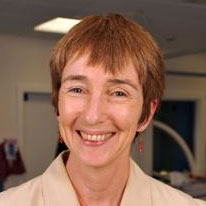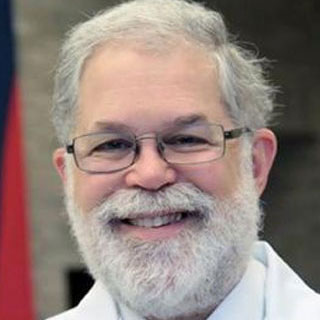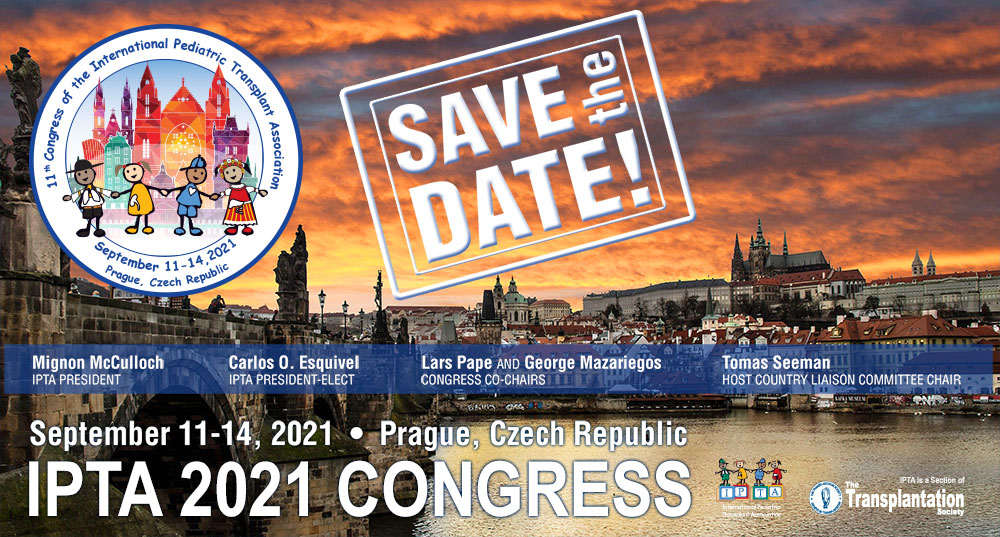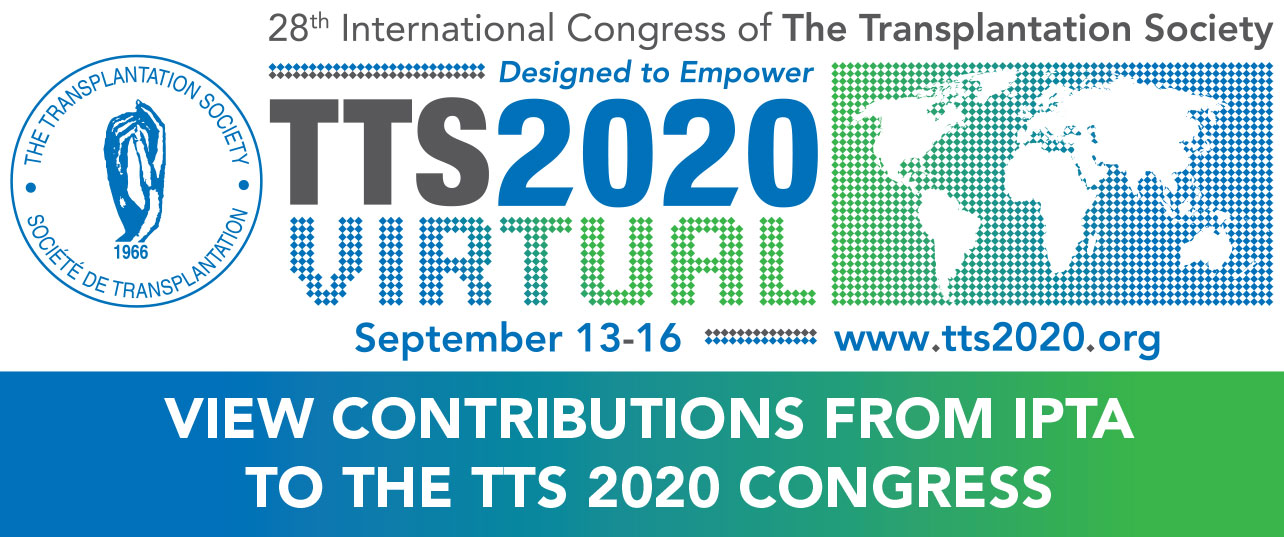IPTA Newsletter - June 2020

Presidential Message
 Dear all,
Dear all,
It seems amazing that it is already the middle of this unusual year which has been dominated by the COVID-19 pandemic and the anxiety associated at all levels. We have all seen changes in the way we live and work, with many transplant programs coming to a temporary halt while assessing the implications and risks of SARS-CoV-2.
On the whole, children appear to acquire and transmit this virus less, compared to adults despite having had transplants and being on immunosuppression. Their parents and medical teams experience anxiety as we find our way with new evidence. Please see a very informative SARS-CoV-2 Literary Review below by our ID Committee.
We are delighted that enthusiasm in our IPTA committees continues to grow, in that we have had over 65 applicants and would really like to thank the outgoing members for their service to IPTA – much appreciated!
We have had to change the way we communicate by relying on webinars and electronic methods as well as considering how we travel to and organize meetings. As a result, we have decided to postpone our IPTA 2021 congress in Prague from April 17-20 to later in the year September 11 – 14, 2021. We are still aiming for a face to face congress in the beautiful city of Prague during the 2021 European autumn.
News about September TTS 2020 is that it will be a completely Virtual meeting and we are excited that IPTA will still have a paediatric track – look out for the program.
Despite all this year’s upheaval, following interviews with our membership last year, the IPTA Council is excited about the development of our IPTA Strategic Plan 2020-2023. Look out for our upcoming international advocacy group survey as part of this process.
Please also find in this newsletter a literary review on recreational marijuana from the Education committee as well as comments from our Ethics committee.
We introduce a new initiative called “Meet the Great’s” – Deirdre Kelly, Richard Fine and Ron Shapiro on this occasion - pioneers in their field who have given years of service in making IPTA the great society it is today – read their stories!
Finally don't forget to pay your IPTA dues so as not to lose your membership privileges after June 2020.
Stay safe and thanks for all you do for the paediatric transplant community.
Best wishes
Mignon McCulloch
IPTA President
IPTA 2020

IPTA is seeking qualified candidates to be considered for open Councilor and Officer positions beginning in April 2021.
All applications will be reviewed by the IPTA Nominations Committee, who will present a final slate of candidate officers and councilors to the IPTA membership for the 2021 election.
The IPTA Nominations Committee welcomes nominations and applications from anyone who has been an IPTA member in good standing for at least 1 year. Service to IPTA on committees or special activities relevant to the society is an asset.
Look out for the opening of the Call for Nominations in September 2020. The deadline for online submission of applications is November 30, 2020.
Literary Review

Not too long ago, marijuana was considered a drug of abuse drug and tended to be a contraindication for transplant, especially in children. The reality is quite different now where recreational marijuana is legal in 11 states for adults over the age of 21, and is legal for medical use in 44 states (including the recreational states). A recent article by Phillip et al. attempted to address the issue of health care provider opinions on the use of marijuana in their manuscript titled “Marijuana in pediatric and adult congenital heart disease, heart transplant listing: A survey of provider practices and attitudes” which was published in Pediatric Transplantation in January of 2020. A survey was sent to pediatric and adult congenital cardiac disease transplant providers (physicians, surgeons, transplant coordinators, and pharmacists), to see if their institution had a policy on marijuana use, and to assess their personal opinions about marijuana use in patients being considered for heart transplantation. The majority of respondents (73%) reported their institution did not have a policy on marijuana use in heart transplant candidates. One of the most interesting finding in this manuscript was that 73% of providers would consider illegal marijuana use an absolute/relative contraindication to heart transplant listing, but the number were lower for legal use. Fifty-seven percent of providers consider a legal recreational user an absolute/relative contraindication. That number decreased to 21% for legal medical users. As expected there was great variability in the responses to this survey. It is clear that most providers from this survey feel that marijuana is both physically and mentally harmful to pediatric patients, but interestingly, they felt better if it was being used for medical purposes. They also felt better with oral or transdermal routes rather than inhaled. This article brings a lot of issues surrounding marijuana, to the forefront. Unfortunately, marijuana is still a scheduled I drug (meaning there is no accepted medical use and it has a high addictive potential), making the likelihood of randomized controlled trials less likely in the near future. This manuscript provides a springboard in addressing this difficult topic and will hopefully lead to further meaningful discussions.
Ethics Committee

Our committee’s primary activity and focus at this time has been the development of position statements on topics of ethical interest for IPTA. It is our hope that these position statements will serve a dual purpose. The first is that they will serve as an expression of the values that we share as individuals engaged in the care of pediatric transplant candidates and recipients worldwide. The second is that they will provide a foundation upon which we can build to achieve the association’s broader goal to advocate on issues of concern to our patients within the context of individual nations as well as the broader international community.
With this goal in mind, we have begun the development of our position statement on the ethical justifications for pediatric priority in organ transplant, which we hope to share with the broader community in the months to come.
Many thanks,
Michael Freeman
Chair, Ethics Committee
Important Notice

Dear IPTA Colleagues,
In these challenging times, we remain very grateful for and reliant upon members’ ongoing support. Several members have continued to pay 2020 dues; however a significant proportion of our membership remains unpaid. We strongly encourage all members to renew IPTA membership, as our dues remains a key source of support for IPTA programs. IPTA members enjoy a number of benefits, including:
- COVID-19 toolkit summarizing published SOT data with resource links for both IPTA members and SOT families
click here - Access to IPTA website, including Member’s Only section
- Subscription to Pediatric Transplantation
- Access to IPTA quarterly newsletter
click here - Reduced registration fees for biennial Congress with upcoming Congress in Prague 2021
- Access to education from IPTA meetings including pediatric symposia from ATC and post-graduate course presentations
If you have already paid your 2020 dues, thank you for your support of IPTA! If you have not yet paid, please click here to renew your membership now. Please note that failure to pay your dues by the end of June 2020 will result in your membership becoming delinquent, which will result in loss of membership benefits. Your ongoing support is greatly appreciated!
Sincerely,
Cozumel Pruette
Chair, Membership Committee
Meet the Greats!

 Richard Fine
Richard Fine
After completing a Chief Resident position @ Children’s Hospital of Los Angeles (CHLA) in 1966, Dr. Richard Fine joined the faculty of the University of Southern California (USC) as an Instructor in Pediatrics @ CHLA in the Division of Metabolic- Renal Diseases. His interest @ that time was in the former not the latter discipline. In September of 1966, he was referred a 6 year old boy with CKD and ESKD and a biopsy diagnosis of Chronic GN. Without the availability of Hemodialysis @ CHLA he initiated Acute Peritoneal Dialysis and for the next 5 months undertook repetitive acute PD on this patient while he assiduously attempted to find alternative facilities to provide ESRD care. The latter were unsuccessful; however, a surgical team from a nearby hospital who had just initiated an adult renal transplantation program agreed to undertake the procedure on this patient with his father’s kidney @ CHLA and an adult nephrologist colleague offered to provide hemodialysis equipment and technical expertise in the event that dialysis was required post-transplant since the resumption of PD would not have been an alternative. After considerable discussion the medical and administrative leadership of CHLA agreed to proceed with the proviso that Dr. Fine learned how to undertake hemodialysis in children and how to manage pediatric patients following kidney transplantation. This child received a transplant from his father in February 1967 and the kidney functioned until early 2020 (almost 53 years) when this now almost 60 year gentlemen required the initiation of hemodialysis. In June 1967, Dr. Fine embarked upon a career as a Pediatric Nephrologist by spending a month @ the Home Hemodialysis training center @ Mt Sinai Hospital in Los Angeles. In August 1967 the first child underwent hemodialysis @ CHLA and in December 1967 the first patient received a kidney transplant performed by the faculty @ CHLA. Subsequently he developed the first multidisciplinary team to treat children with ESRD and during the latter part of the 1960’s and during the 1970’s pediatric nephrology colleagues from around the world visited CHLA to obtain expertise in the management of children with ESRD and returned to their institutions to initiate Dialysis and Transplantation programs.
In 1980 Dr. Fine accepted the position of Head, Division of Pediatric Nephrology @ UCLA School of Medicine and during the 1980’s, with the help of a number of colleagues and fellows from around the world, developed an outstanding ESRD program that incorporated basic and clinical research with clinical care that was instrumental in moving ESRD care for children forward.
Over the subsequent 30 years Dr. Fine had leadership roles (Councillor, Secretary, Treasurer, President) in the following academic societies: Americana Society of Pediatric Nephrology, The Transplantation Society, International Pediatric Nephrology Association, International Peritoneal Dialysis Association, NAPRTCS, American Society of Transplantation and most recently the President of the International Pediatric Transplant Association from 2009 - 2011. His involvement in these organizations facilitated his ability to enhance the care of children worldwide with ESKD.
Shawney and Richard will have been married for 48 years this August. Between them they have 4 children, 11 grandchildren and 2 great grandsons. Their favorite hobby is traveling which is currently on hold. Dr. Fine is still teaching and supervising residents and medical students @ Stony Brook (Renaissance School of Medicine) and in Los Angeles @ LAC+USC (Keck School of Medicine). Their eldest granddaughter is a 3rd Medical Student @ Stony Brook and she aspires to be an Infertility Physician.
 Deirdre Kelly
Deirdre Kelly
Professor Deirdre Kelly is Professor of Paediatric Hepatology at the University of Birmingham, Consultant Paediatric Hepatologist and Founding Director of the Liver Unit for Birmingham Women’s & Children's Hospital NHS Foundation Trust. She was born and brought up in India and is a graduate of Trinity College, Dublin.
She has trained in both adult and paediatric gastroenterology and hepatology. She set up the Paediatric Liver Unit at Birmingham Women’s & Children's Hospital in 1989 which provides a national and international service for children with liver failure and undergoing liver transplantation, focused on family centres care which has transformed survival and outcome for these children.
Professor Kelly’s research interests include understanding the genetic basis for neonatal liver disease, improving diagnosis using innovative genetic screening and developing models to treat genetic disease. Her research has led to centralisation of care for children with biliary atresia; improvements in therapy for viral hepatitis in children and the quality and outcome of life following liver and/or intestinal transplantation. She has initiated international research into graft outcomes post-transplant (Graft Injury Group).
She has been President of the European Society of Paediatric Gastroenterology, Hepatology and Nutrition (ESPGHAN) (2006-2010), British Society for Paediatric Gastroenterology, Hepatology and Nutrition (BSPGHAN) (2004-2007) and the International Pediatric Transplant Association (IPTA) (2002-2005).
Professor Kelly is author of several textbooks about paediatric liver disease and has published many original articles and chapters on liver disease, liver transplantation and viral hepatitis. She is deputy Editor of Liver Transplantation (2015- ).
Professor Kelly was made a CBE (Commander of the British Empire) by her Majesty the Queen in 2016 and received the ESPGHAN Distinguished Service award in 2016 and the EASL Recognition Award in 2019.
She is most proud of being mother to two wonderful sons and grandmother to four grandchildren.
 Ron Shapiro
Ron Shapiro
Ron Shapiro, MD is Professor of Surgery and Surgical Director, Kidney/Pancreas Transplantation, at the Recanati/Miller Transplantation Institute at the Icahn School of Medicine at Mount Sinai. He has been involved in clinical adult and pediatric kidney transplantation and in adult pancreas transplantation for over 30 years. The focus of Dr. Shapiro’s research has been generally within the fields of clinical renal and pancreatic transplantation, and more specifically, with the development and optimization of immunosuppressive protocols. He has participated in a number of randomized clinical trials to demonstrate the efficacy of tacrolimus-based immunosuppression, and has helped develop the agent for use in clinical renal and pancreatic transplantation. More recently, he has focused on strategies to minimize immunosuppression after transplantation. Additional interests include analysis of adverse events related to immunosuppression, including post-transplant diabetes mellitus and viral infections, including cytomegalovirus, Epstein-Barr virus, and BK virus. Finally, a significant part of Dr. Shapiro’s academic interest has involved the publication of comprehensive textbooks, including an Atlas of Organ Transplantation, a textbook on Renal Transplantation, a textbook on Pancreatic Transplantation, and a textbook on Living Donation. He has co-authored over 480 papers and book chapters, edited 4 books and given over 550 lectures around the world. He is the current Editor in Chief of Clinical Transplantation.
Dr. Shapiro is a longstanding supporter of IPTA. He joined IPTA in 1999, was on the IPTA Council from 2005 – 2009 and contributed to multiple different IPTA committees and initiatives over the years. Dr. Shapiro became President Elect in 2011, President in 2013, and finally served as Past President from 2015 – 2017. He helped to transition IPTA to becoming a section of TTS where he has served as Councilor (2004-2006), Treasurer (2006-2010), Vice-President (2010-2013) and President 2013 – 2015.
Dr. Shapiro has been married to Mary Austin since 1985 and they have 2 daughters, Rachel (who is a tax attorney) and Ana (who teaches high school science and engineering). His interests outside of medicine include photography, folk guitar and traveling.
IPTA 2021

Literary Review

Prepared by Arnaud L’Huillier, Michael Green, and Monica Ardura on behalf of the IPTA IDCARE committee
Children, Transplantation, and SARS-CoV-2
COVID-19 caused by the novel coronavirus Severe Acute Respiratory Syndrome Coronavirus 2 (SARS-CoV-2) has emerged since December 2019 to quickly cause a global pandemic. Now 5 months into the pandemic and with over 3.5 million cases leading to 243,401 deaths, we are still learning about the impact of COVID-19 on children, including those after transplantation.1 Extrapolating from experience with other community respiratory viral infections, there was initial concern that SARS-CoV-2 would disproportionally affect children, cause more severe disease and worse outcomes, particularly in pediatric transplant recipients given their underlying immunosuppression and other comorbidities. Influenza infection for example, is associated with increased morbidity and mortality among transplant recipients.2-4 Similarly, transplant recipients are more at risk for severe respiratory syncytial virus (RSV), parainfluenza virus (PIV), adenovirus (ADV) and possibly human metapneumovirus (HMPV) infections.3-5
However, early preliminary data from Asia, followed by Europe, and now North America report that children account for only ~ 2% [range 0.9-4.8%] of documented COVID-19 cases.6-11 Furthermore, the clinical manifestations in children in general are not as severe as their adult counterparts.7,12 More frequently, children may be asymptomatic or have mild to moderate disease and are even less likely to experience the typical symptoms such as fever, cough, or shortness of breath described in adults.7,9,12 Interestingly, children were also underrepresented in terms of both frequency and severity of infections with SARS-CoV-1 and MERS-CoV.13,14 Whether this represents a common viral characteristic across coronaviruses is unknown. Infection with human coronaviruses (HCoV), such as HCoV-229E, -NL63, -OC43 and -HKU1 is also less frequent in children than adults, causing fewer lower respiratory tract infections (LRTIs).15 Severe COVID-19 presentations in children are overall rare (occurring in 6% of children vs ~25% of adults), occur more frequently in younger children, and carry lower case fatality rates than adults.6,7,9,16-21 However, emerging data in the US from the epicenter in New York City, describe a higher rate for pediatric intensive care admissions and severe disease in older children than previously recognized.22 More recently, reports from Europe of a Pediatric Multisystem Inflammatory Syndrome (PMIS) or multisystem inflammatory syndrome in children (MIS-C) in the United States are emerging and describe children presenting with fever and a hyperinflammatory shock phenotype resembling hemophagocytic lymphohistiocytosis, toxic shock syndrome, or Kawasaki disease with many having virologic or serologic evidence of COVID-19.23-28
The reasons behind the distinct epidemiology in children with COVID-19 remain to be elucidated. Children may be as likely to be infected as adults, but infrequently have disease progression.29,30 Some proposed explanations include that children are overall less susceptible to SARS-CoV-2 possibly related to distinct pediatric angiotensin-converting enzyme receptor concentrations or activity in the LRT, lack of being ‘primed’ with HCoV antibody or alternatively cross-reactive immunity, an immature or less robust immune response, distinct T cell repertoire, or lack of immunosenescence.26,31,32 Aside from needing a better understanding of the host response to infection, much of our current knowledge of SARS-CoV-2 viral dynamics is based on data from immunocompetent adults.33-36 Additional data of viral dynamics in children with distinct clinical manifestations are needed.37,38 The number of remaining questions re: COVID-19 in children currently add to the challenges of pediatric transplantation.39
Risk factors for severe disease and mortality with COVID-19 are advanced age, cardiac diseases, diabetes, hypertension and obesity.35,40,41 Surprisingly, immunosuppression and transplantation have not been consistently been described as risk factors for SARS-CoV-2 infection42-45 though data are emerging46 and they have previously been identified as risk factors for severe infection with other HCoV.4,47 Similarly, few cases of SARS-CoV-1 and MERS-CoV were reported among adult transplant recipients, including atypical presentations48-51, but no pediatric cases. For SARS-CoV-2, published infections have been documented in the adult transplant setting, with notable geographic differences in both prevalence and severity.52-54 Few published cases have been reported in pediatric SOT recipients thus far.55-57
Despite learning a large amount of information about COVID-19 in a short time, there continue to be significant knowledge gaps of this disease in children. The lack of COVID-19- associated morbidity or mortality reported in the pediatric and immunocompromised transplant population remains puzzling. It has been suggested that the host innate immune response is the main driver of lung tissue damage during coronavirus infection, perhaps explaining why immunocompromised patients may be underrepresented in the current pandemic.55 Whether there are underlying biologic differences in children vs adults to explain these differences remains to be clarified. Improved understanding of these differences will likely lead to better understanding of viral pathogenesis and host responses. Additionally, concerted, multi-institutional efforts are needed to better ascertain the epidemiology, clinical characteristics, and outcomes of COVID-19 in pediatric transplant recipients. Given the rapidly evolving landscape, pediatric transplant centers would benefit from sharing their collective experiences and keeping abreast of the emerging data, best practices, and recommendations related to COVID-19.
References
- WHO COVID-19 - Situation Report, 05/05/2020. 2020. at https://www.who.int/emergencies/diseases/novel-coronavirus-2019/situation-reports/.)
- Kumar D, Ferreira VH, Blumberg E, et al. A 5-Year Prospective Multicenter Evaluation of Influenza Infection in Transplant Recipients. Clin Infect Dis 2018;67:1322-9.
- Manuel O, Estabrook M, American Society of Transplantation Infectious Diseases Community of P. RNA respiratory viral infections in solid organ transplant recipients: Guidelines from the American Society of Transplantation Infectious Diseases Community of Practice. Clin Transplant 2019;33:e13511.
- Ison MG, Hirsch HH. Community-Acquired Respiratory Viruses in Transplant Patients: Diversity, Impact, Unmet Clinical Needs. Clin Microbiol Rev 2019;32.
- Florescu DF, Schaenman JM, Practice ASTIDCo. Adenovirus in solid organ transplant recipients: Guidelines from the American Society of Transplantation Infectious Diseases Community of Practice. Clin Transplant 2019;33:e13527.
- Wu Z, McGoogan JM. Characteristics of and Important Lessons From the Coronavirus Disease 2019 (COVID-19) Outbreak in China: Summary of a Report of 72314 Cases From the Chinese Center for Disease Control and Prevention. JAMA 2020.
- Dong Y, Mo X, Hu Y, et al. Epidemiological Characteristics of 2143 Pediatric Patients With 2019 Coronavirus Disease in China. Pediatrics 2020.
- Liu W, Zhang Q, Chen J, et al. Detection of Covid-19 in Children in Early January 2020 in Wuhan, China. N Engl J Med 2020;382:1370-1.
- Lu X, Zhang L, Du H, et al. SARS-CoV-2 Infection in Children. N Engl J Med 2020.
- Tagarro A, Epalza C, Santos M, et al. Screening and Severity of Coronavirus Disease 2019 (COVID-19) in Children in Madrid, Spain. JAMA Pediatr 2020.
- Korean Society of Infectious D, Korean Society of Pediatric Infectious D, Korean Society of E, et al. Report on the Epidemiological Features of Coronavirus Disease 2019 (COVID-19) Outbreak in the Republic of Korea from January 19 to March 2, 2020. J Korean Med Sci 2020;35:e112.
- Team CC-R. Coronavirus Disease 2019 in Children - United States, February 12-April 2, 2020. MMWR Morb Mortal Wkly Rep 2020;69:422-6.
- Stockman LJ, Massoudi MS, Helfand R, et al. Severe acute respiratory syndrome in children. Pediatr Infect Dis J 2007;26:68-74.
- Al-Tawfiq JA, Kattan RF, Memish ZA. Middle East respiratory syndrome coronavirus disease is rare in children: An update from Saudi Arabia. World J Clin Pediatr 2016;5:391-6.
- Ambrosioni J, Bridevaux PO, Wagner G, Mamin A, Kaiser L. Epidemiology of viral respiratory infections in a tertiary care centre in the era of molecular diagnosis, Geneva, Switzerland, 2011-2012. Clin Microbiol Infect 2014;20:O578-84.
- Pathak EB, Salemi JL, Sobers N, Menard J, Hambleton IR. COVID-19 in Children in the United States: Intensive Care Admissions, Estimated Total Infected, and Projected Numbers of Severe Pediatric Cases in 2020. J Public Health Manag Pract 2020.
- Ong JSM, Tosoni A, Kim Y, Kissoon N, Murthy S. Coronavirus Disease 2019 in Critically Ill Children: A Narrative Review of the Literature. Pediatr Crit Care Med 2020.
- Sanita ISD. Epidemia COVID-192020 March 9, 2020.
- Liu W, Zhang Q, Chen J, et al. Detection of Covid-19 in Children in Early January 2020 in Wuhan, China. N Engl J Med 2020.
- Castagnoli R, Votto M, Licari A, et al. Severe Acute Respiratory Syndrome Coronavirus 2 (SARS-CoV-2) Infection in Children and Adolescents: A Systematic Review. JAMA Pediatr 2020.
- Cui Y, Tian M, Huang D, et al. A 55-Day-Old Female Infant infected with COVID 19: presenting with pneumonia, liver injury, and heart damage. J Infect Dis 2020.
- Chao JY DK, Herold BC, et al. Clinical Characteristics and Outcomes of Hospitalized and Critically Ill Children and Adolescents with Coronavirus Disease 2019 (COVID-19) at a Tertiary Care Medical Center in New York City. Journal of Pediatrics 2020.
- Riphagen S GX, Gonzalez-Martinez C, et al. Hyperinflammatory shock in children during COVID-19 pandemic The Lancet 2020.
- Mehta P, McAuley DF, Brown M, et al. COVID-19: consider cytokine storm syndromes and immunosuppression. Lancet 2020;395:1033-4.
- Jones VG, Mills M, Suarez D, et al. COVID-19 and Kawasaki Disease: Novel Virus and Novel Case. Hosp Pediatr 2020.
- Sun D, Li H, Lu XX, et al. Clinical features of severe pediatric patients with coronavirus disease 2019 in Wuhan: a single center's observational study. World J Pediatr 2020.
- Wang Y, Zhu F, Wang C, et al. The Risk of Children Hospitalized With Severe COVID-19 in Wuhan. Pediatr Infect Dis J 2020.
- Verdoni L MA, Gervasoni A, et al. An outbreak of severe Kawasaki-like disease at the Italian epicentre of the SARS-CoV-2 epidemic: an observational cohort study. The Lancet 2020.
- Bi Q, Wu Y, Mei S, et al. Epidemiology and transmission of COVID-19 in 391 cases and 1286 of their close contacts in Shenzhen, China: a retrospective cohort study. Lancet Infect Dis 2020.
- Lu X, Zhang L, Du H, et al. SARS-CoV-2 Infection in Children. N Engl J Med 2020;382:1663-5.
- Mizumoto K OR, and Nishiura H. Age specificity of cases and attack rate of novel coronavirus disease (COVID-19). 2020.
- Zhu L, Lu X, Chen L. Possible causes for decreased susceptibility of children to coronavirus. Pediatr Res 2020.
- Wolfel R, Corman VM, Guggemos W, et al. Virological assessment of hospitalized patients with COVID-2019. Nature 2020.
- Zou L, Ruan F, Huang M, et al. SARS-CoV-2 Viral Load in Upper Respiratory Specimens of Infected Patients. N Engl J Med 2020;382:1177-9.
- Pan Y, Zhang D, Yang P, Poon LLM, Wang Q. Viral load of SARS-CoV-2 in clinical samples. Lancet Infect Dis 2020;20:411-2.
- Wang W, Xu Y, Gao R, et al. Detection of SARS-CoV-2 in Different Types of Clinical Specimens. JAMA 2020.
- Cai J, Xu J, Lin D, et al. A Case Series of children with 2019 novel coronavirus infection: clinical and epidemiological features. Clin Infect Dis 2020.
- Jones TC MB, Veith T, et al. An analysis of SARS-CoV-2 viral load by patient age. 2020.
- Chen CY, Chen SF, Hollander SA, et al. Donor heart selection during the COVID-19 pandemic: A case study. J Heart Lung Transplant 2020;39:497-8.
- Ruan Q, Yang K, Wang W, Jiang L, Song J. Clinical predictors of mortality due to COVID-19 based on an analysis of data of 150 patients from Wuhan, China. Intensive Care Med 2020.
- Guan WJ, Ni ZY, Hu Y, et al. Clinical Characteristics of Coronavirus Disease 2019 in China. N Engl J Med 2020;382:1708-20.
- Leung GM, Hedley AJ, Ho LM, et al. The epidemiology of severe acute respiratory syndrome in the 2003 Hong Kong epidemic: an analysis of all 1755 patients. Ann Intern Med 2004;141:662-73.
- Badawi A, Ryoo SG. Prevalence of comorbidities in the Middle East respiratory syndrome coronavirus (MERS-CoV): a systematic review and meta-analysis. Int J Infect Dis 2016;49:129-33.
- Novel Coronavirus Pneumonia Emergency Response Epidemiology T. [The epidemiological characteristics of an outbreak of 2019 novel coronavirus diseases (COVID-19) in China]. Zhonghua Liu Xing Bing Xue Za Zhi 2020;41:145-51.
- Minotti C, Tirelli F, Barbieri E, Giaquinto C, Dona D. How is immunosuppressive status affecting children and adults in SARS-CoV-2 infection? A systematic review. J Infect 2020.
- Akalin E, Azzi Y, Bartash R, et al. Covid-19 and Kidney Transplantation. N Engl J Med 2020.
- Garbino J, Crespo S, Aubert JD, et al. A prospective hospital-based study of the clinical impact of non-severe acute respiratory syndrome (Non-SARS)-related human coronavirus infection. Clin Infect Dis 2006;43:1009-15.
- Kumar D, Humar A. Emerging viral infections in transplant recipients. Curr Opin Infect Dis 2005;18:337-41.
- Lam MF, Ooi GC, Lam B, et al. An indolent case of severe acute respiratory syndrome. Am J Respir Crit Care Med 2004;169:125-8.
- Kim SH, Ko JH, Park GE, et al. Atypical presentations of MERS-CoV infection in immunocompromised hosts. J Infect Chemother 2017;23:769-73.
- AlGhamdi M, Mushtaq F, Awn N, Shalhoub S. MERS CoV infection in two renal transplant recipients: case report. Am J Transplant 2015;15:1101-4.
- Zhu L, Xu X, Ma K, et al. Successful recovery of COVID-19 pneumonia in a renal transplant recipient with long-term immunosuppression. Am J Transplant 2020.
- Guillen E, Pineiro GJ, Revuelta I, et al. Case report of COVID-19 in a kidney transplant recipient: Does immunosuppression alter the clinical presentation? Am J Transplant 2020.
- Pereira MR, Mohan S, Cohen DJ, et al. COVID-19 in Solid Organ Transplant Recipients: Initial Report from the US Epicenter. Am J Transplant 2020.
- D'Antiga L. Coronaviruses and immunosuppressed patients. The facts during the third epidemic. Liver Transpl 2020.
- Russell MR HN, Alejos JC, et al. COVID-19 in a pediatric heart transplant recipient: Emergence of Donor Specific Antibodies. The Journal of Heart and Lung Transplantation 2020.
- Lagana SM, De Michele S, Lee MJ, et al. COVID-19 Associated Hepatitis Complicating Recent Living Donor Liver Transplantation. Arch Pathol Lab Med 2020.
Survey

Dear Potential Participant:
As a practicing pediatric gastroenterologist/hepatologist or transplant surgeon you are invited to participate in an anonymous survey. The objective of our study is to evaluate “increased risk” donor livers (increased risk for recent HIV, HBV, and HCV infections) as an option for transplant into pediatric candidates. The goal of the study is to better understanding why or why not “increased risk” donor livers are accepted/rejected in these patients. We would like to collect your perspective and experience with increased risk liver donations and pediatric candidates. We ask that you consider completing this anonymous online survey, which will take approximately 10 minutes of your time. Please make use of the spaces for comments to provide reflections on your experience and opinions on this matter. Your participation in this survey is completely voluntary. Please only complete the survey once, even if you receive a second request. This project has been reviewed and approved by the Institutional Review Board at the University of Nebraska Medical Center (IRB # 016-20-EX).
Thank-you in advance for your time! If you have any questions or concerns you are welcome to contact us (information below).
Sincerely,
Dr. Blaire Anderson
Abdominal Transplant Surgery Fellow
University of Nebraska Medical Center
blaire.anderson@unmc.edu
402-599-0265
Dr. Nathalie Sela
Abdominal Transplant Surgery Fellow
University of Nebraska Medical Center
nathalie.sela@unmc.edu
402-650-4982
Dr. Arika Hoffman
Assistant Professor
University of Nebraska Medical Center
arika.hoffman@unmc.edu
402-559-3434
IPTA Track at TTS 2020

Due to the COVID-19 pandemic, TTS 2020 will now be a completely Virtual Meeting, across 3 different time zones!
IPTA will be representing the Pediatric track, with a SOTA, Early Morning Workshop, and a Pre-Congress Workshop incorporating 3 different sessions. Please check the program to find out more about how IPTA is leading the field in pediatric transplantation and continuing to advocate for children who require transplants.
Social
Contact
Address
International Society of Uterus Transplantation
c/o The Transplantation Society
740 Notre-Dame Ouest
Suite 1245
Montréal, QC, H3C 3X6
Canada
